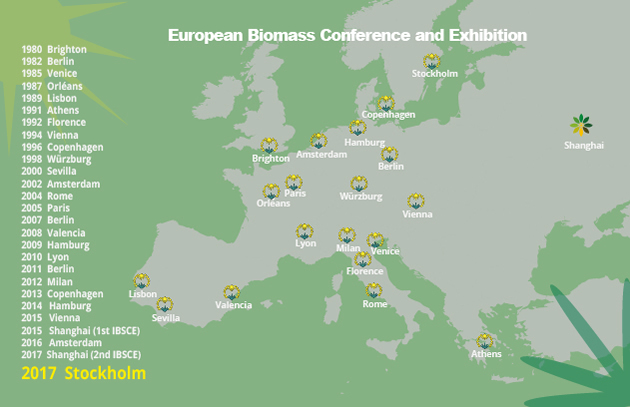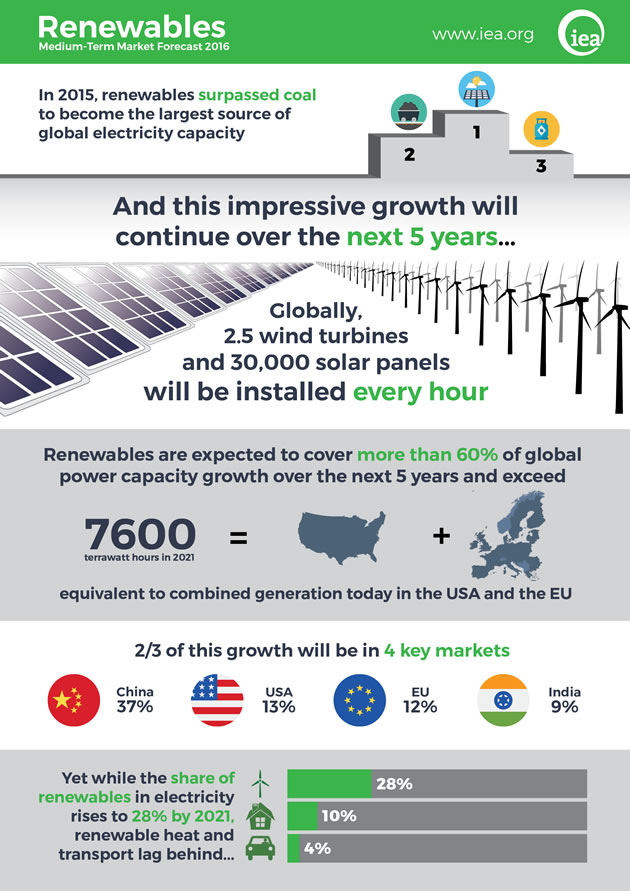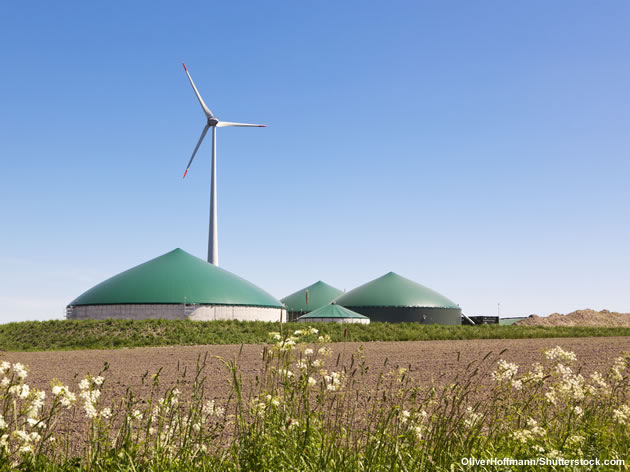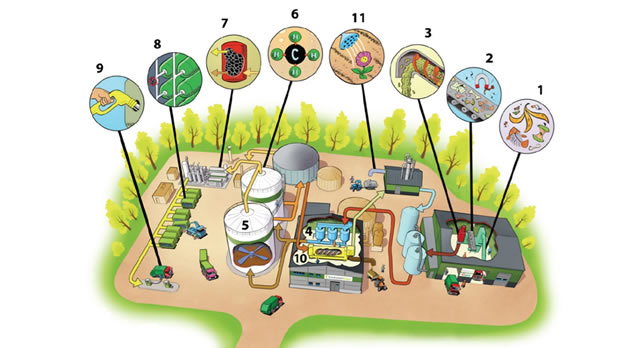 |
      |
| |
European Biomass Conference and Exhibition News No. 60
|
Biomass and Integration in Future Energy Systems and the Bioeconomy |
 |
Biomass was the primary source of materials and energy until the industrial revolution set off a series of major changes around two hundred years ago. In the industrialized world fossil fuels became the primary source for energy in the forms of electricity and heat and provided almost all fuels for transport. However, biomass continued to maintain an important role in the economies in both developed and developing countries.
Over recent years the contribution of biomass to energy, fuels and materials supply has been steadily increasing in response to the need to reduce CO2 emissions from the non-renewable fossil fuels. The EU target for 2020 is to reach a 20% contribution of renewable to energy use with a corresponding aim to achieve a 20% reduction of CO2 emissions; more ambitious targets are projected for post-2020. Biomass contributes to around 60% of the renewable energy needed to reach the 2020 target. Just as in the days before the industrial revolution biomass is not only expected to be used for energy but for the production of biomaterials and biochemicals within a growing and (re)emerging bioeconomy.

EUBCE has for more than 30 years tracked the progress of research and industrial development of modern day uses of biomass. While the broad scope of the conference has changed little over the years, some topics have expanded and developed more than others.
Over recent years the biorefinery approach has grown in importance in order to maximize resource efficiency and indeed to improve financial performance, given the comparatively high value of some non-energy products of biomass (see Newsletter No. 58). It has also become apparent that it is vital not only to maximise the efficiency of energy recovery from biomass, but that intelligent integration of the delivery of bioenergy into the energy supply infrastructure is essential.
This integration presents a challenge for researchers and industrial users and also opportunities to implement clever solutions that must be financially viable.
In order to achieve CO2 reduction targets, the United Nations Climate Change Conference of Parties (COP) recognizes that all forms of renewable energy and fuels will be needed.
Therefore, the 25th EUBCE has at its heart "The Indispensible Role of Biomass".
The conference in Stockholm (June 12th to 15th 2017) will kick off with examples of industry scale implementation of bioenergy and biofuels projects and an expert panel will discuss the roles for biomass that make it indispensible for the replacement of fossil fuels.

While the IEA reported (*see IEA report image) that renewables surpassed coal in 2015 as the largest source of global electricity generating capacity, clearly more must be done before fossil-free energy can be realized.
Integration is multi-facetted. Over recent years the biogas sector has grown beyond being a provider of base load power to electricity grids. Biogas and it purer form, biomethane which is fully compatible with natural gas, can be stored and used to provide peak electricity demand and indeed demand resulting from low output of other renewable such as wind and solar.
Flexible biogas production and/or utilization can thereby be used to support fluctuating electricity demand and grid stability. Fast pyrolysis is being used to produce a bio-oil for conversion to high quality biofuel that is storable and available for use in transport or as needed for heat and power on demand. Gasification is increasingly being used in an innovative manner to produce synthetic gases that can be used as a replacement for natural gas engine after upgrading.

All of these examples are being currently being demonstrated and new developments in the technologies and related subjects are addressed in Topics 2, 3 and 6 of EUBCE Programme.
In Topic 5 there are examples of pilot demonstration projects concerning integration of biomass utilization to support sustainable replacement of fossil fuels in the energy supply sector. The challenge of intermittent electricity supply from wind and solar power is currently the main focus and technologies and systems solutions are presented. Systems include smart design and operation of energy supply grids. Looking beyond the challenge of power grid stability is the wider scope of the emerging bioeconomy which is developing strongly from a small base. Biorefineries are a key to bioeconomy development and the EUBCE provides a broad scope for the progress and directions of the science and technology of biorefineries in Topic 3. This brings us back to the vital resource of biomass (Topic 1), its production, harvesting, supply logistics and its selection and preparation for use, all of which are part of the integration of biomass into the evolving low-carbon economy needed to limit climate change. And EUBCE completes the spectrum of subjects with the supporting political policy discussions, environmental impacts and markets in Topic 4.
No single source of clean energy can exist alone in the complex supply systems of both developed and developing countries. Integration of energy resources and the conversion technologies are an essential part of the evolution of societies. EUBCE attempts to address the needs from the perspective of the biomass sector.
Parallel Events |
 |
Jointly presented with major international organisations, and in addition to the Conference Programme, the EUBCE 2017 Parallel Events and Workshops offer a deep insight into specific topics along the most recent technologies market and business trends and address the global decision makers from industry, research, finance and politics.
These additional half-day-sessions are open to all registered conference participants of the EUBCE 2017.
EUBCE Technical Visit: Scandinavian Biogas Södertörn Plant |
 |
Tuesday 13 June, 10:00 a.m., meeting point: Stockholmsmässen Main Entrance
Visit to Scandinavian Biogas Södertörn Plant: the first industrial food waste based biogas plant in Stockholm County
Treating 60,000 tonnes of food waste per year, the plant has a capacity to generate over 80 GWh, corresponding to 8.8 million litres of petrol and enough to meet the annual fuel needs of 5,000 private motorists. At full capacity, the plant also produces 14,000 tonnes of dewatered bio-fertiliser. Inaugurated in 2015, the facility is located at Södertörn, 20 minutes south of Stockholm City. It is a joint project with SRVåtervinning AB, which is owned by five local municipalities, that represent a unique example of integrated waste management for sustainable biofuels production and the development of circular economy.
A unique experience to discover the most sustainable process for biofuels production.
Organised in cooperation with the Biogas Research Centre (BRC), as part of the EffiSludge for LIFE project, this technical visit offers to the EUBCE 2017 delegates a unique opportunity to discover, step-by-step, how waste can be turned into valuable products such as biogas and fertiliser.
Registration is on a first come, first served basis and space is limited up to 45 people max.
Please confirm your participation by filling in the registration form here.

Scandinavian Biogas Södertörn – 1.Waste accepting point; 2.Sorting station; 3.Preprocessing; 4.Hygenisation; 5.Primary digestion; 6.Secondary digestion and gas holder; 7.Upgrading; 8.Storage; 9.Filling station; 10.Dewatering; 11.Evaporation and fertiliser storage.
Registration: A Number of Options to Match your Needs |
 |
You have access to all plenary, oral and visual sessions of the EUBCE Conference Programme, as well as to EUBCE Parallel Events, on day(s) registered. You further have access to the Exhibition. Coffee breaks (on day(s) registered), Welcome Reception, complete EUBCE material (e.g. bag, programme brochure), WLAN on-site, use of wardrobe on-site and free access to Conference Proceedings 2017 right after publication are also included.
Networking Lunch
The EUBCE 2017 Networking Lunch takes place from Monday to Thursday, 12-15 June 2017 in a dedicated networking area in an exclusive ambiance.
You can book your ticket(s) within your online registration process.
More information on www.eubce.com
|
|
|
|
|
|
|
|
|
|
|
| |
INSTITUTIONAL BIOMASS INDUSTRY COOPERATION
|
|
|
|
|
|
|
|
|
|
|
|
|
|
|
|
|
| |
NATIONAL SUPPORTING ORGANISATIONS
|
|
|
|
|
|
|
|
|
| |
NATIONAL SUPPORTING ASSOCIATIONS
|
|
|
|
|
|
|
|
|
|
|
|
|
|
|
|
|
|
|
|
|
|
|
|
|
|
|
| |
Organised by
|
with the support of
|
|
|
|
|
|
|
|
|
|
|
|
|
|
|
| |
This email was sent by: ETA-Florence Renewable Energies
Via A. Giacomini 28, Firenze, 50132 Italy
|
|
Unsubscribe
|
|
|
| |
|






